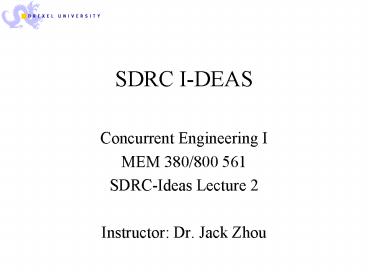SDRC IDEAS - PowerPoint PPT Presentation
1 / 22
Title:
SDRC IDEAS
Description:
Master Modeler -- Construct solid models. Master Surfacing -- Construct complicated surfaces ... Construct sheet metal parts. Harness Design -- Construct wire ... – PowerPoint PPT presentation
Number of Views:116
Avg rating:3.0/5.0
Title: SDRC IDEAS
1
SDRC I-DEAS
- Concurrent Engineering I
- MEM 380/800 561
- SDRC-Ideas Lecture 2
- Instructor Dr. Jack Zhou
2
SDRC I-DEAS Design Application
- Tasks Within Design Application
- Master Modeler -- Construct solid models
- Master Surfacing -- Construct complicated
surfaces - Master Assembly -- Assemble various parts
- Mechanism Analysis -- Analyze mechanisms
- Sheet Metal -- Construct sheet metal parts
- Harness Design -- Construct wire harnesses
- Drafting Setup -- Automatically creates drafting
drawing - Tolerance Analysis -- Analyzes tolerances
- Rapid Prototype -- Creates output for RP Machine
3
SDRC I-DEAS Design Application
- Master Modeler - How to create a prismatic part
Create wireframe and extrude
Create features and move into position
Cutout features to create the final part
4
EXAMPLE - Key Tasks
5
EXAMPLE - Key Tasks
6
EXAMPLE - Key Tasks
7
EXAMPLE - Step 1 2
- STEP 1 2..Create wireframe Dimension
Sketch the cross-section, be sure the indicated
edges are not vertical
Dimension the cross-section using the following
dimensions
8
EXAMPLE - Step 3
- STEP 3..Extrude the Cross-section
Creating the cutouts It is important that the
cutout be parallel to the angled back edge and
aligned with each other
Extrude the cross-section into the basic part
9
EXAMPLE - Step 4
- STEP 4..Sketch the cut-out
Dimension the bracket using the dimensions below.
Make sure the back edge of the cross-section is
parallel with the back edge
Use sketch in plane command to sketch on one side
of the bracket
10
EXAMPLE - Step 5
- STEP 5..Extrude the cut-out
Sketch the cross-section on the other side. Use
focus to project key points instead of
dimensioning again
Extrude the cutout 25mm into the bracket
11
EXAMPLE - Step 6
- STEP 6..Creating the cut-outs
Pick the edge to sketch
12
EXAMPLE - Step 7
- STEP 7..Extrude
Make the circular cut-out at the bottom
Extrude the cutout 25mm into the bracket
13
EXAMPLE - Step 8
- STEP 8..Creating the circles
On the bottom surface, sketch the circle using a
construction line parallel with the back edge.
Dimension as shown.
14
EXAMPLE - Step 9
- STEP 9..Cutting out the circles
Pick the sections indicated in blue, and extrude
them upward to cut out the edges of the base.
Result
15
EXAMPLE - Step 10
- STEP 10..Shaping Extruding the base
Sketch a circle on the bottom surface of the
bracket and constrain it using the following
dimensions
Extrude the circle 10mm to create the base
16
EXAMPLE - Step 11
- STEP 11..Cutting the slot
Select the back face of one of the cutouts. This
defines the plane on which to sketch the slot.
Cut a rounded slot into the back of the part.
The back of the slot is on the same plane as the
back face of the cutouts
17
EXAMPLE - Step 12
- STEP 12..Sketching extruding the slot
Select the oval defined by the circles and sides
(use stop at intersections option) and extrude it
to the front
Sketch the rectangle and the circles inside the
rectangle using the tan to three circle. Since
the circles are constrained inside the rectangle
the will grow or shrink with it. Dimension as
shown
18
EXAMPLE - Step 13
- STEP 13..Cutting the vertical bore
Create the coordinate system, and attach it to
the bottom plane as shown
For this bore, no existing plane cuts through the
center of the base, which is where the bore must
be aligned. You can define the needed plane by
creating a coordinate system on the bottom face
of the base
19
EXAMPLE - Step 14
- STEP 14..Sketch the cross-section revolve
Revolve the cross-section to create a bore
cut-out. Choose the vertical edge of the
cross-section rather than th z-axis as the axis
of revolution
Sketch the cross-section of the bore on the Y-Z
plane. Focus on the intersection of the Y and Z
axes, and use that point as the first point in
the cross-section
20
EXAMPLE - Step 15
- STEP 15..Creating the pin hole cross-section
The pin hole cuts the part from one side to the
other. The pin hole must cut through the center
of the bore.
Sketch the cross-section on the end plane.
Constrain using the following dimensions. Focus
on the centerline of the bore to project a
guideline onto the sketch plane. Position the
cross-section on this line.
21
EXAMPLE - Step 16
- STEP 16..Extruding the pin hole
To reduce local stress, fillet all the inside
edges of the cutouts. Chamfer the transitions
between the bore to remove the sharp edges
Use the extrude command to cut-out the
cross-section and create the pin hole
22
EXAMPLE - Step 17
- STEP 17..Creating the chamfers
Result
- Fillet the inside vertices of each cutout 6mm
- Fillet the second inner edge of the bore 1.27
mm - Finally, chamfer the bottom edge of the bore 3mm































